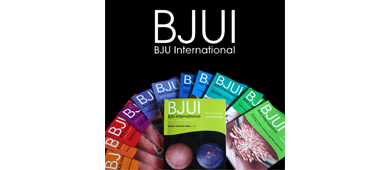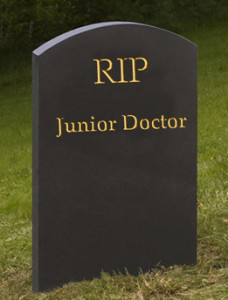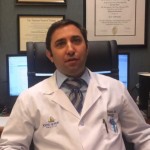The Death of the Junior Surgeon
I think I attended a meeting recently at which I fear, after many years of being slowly deprived of oxygen by various organisations, a component of a profession which I love and to which I have devoted so much of my life, finally started to give up the fight and started to die.
I am involved in training as a training programme director as well as being a local trainer. As a TPD I have had to watch the separation of the London and KSS training programmes. This has happened, despite sitting in a room of thirty to forty senior trainers who all voiced the opinion that this is detrimental to the future of urology training for our trainees. The trainees also voiced an opinion that this was wrong but still it went ahead.
Recently, I sat in a room where, again, a group of thoughtful intelligent doctors spoke about the future of junior doctor training. We are about to impose a change in the training of foundation year doctors imposed upon our excellent organisation from what for most of us is a faceless organisation with whom we will never interact directly. We will be moving them into community-based jobs that no senior doctor round the table believed was in their interests or in the interests of the future of Britain’s healthcare, but we will still oversee that process.
And what test is being applied to what our junior doctors should be doing to justify these changes? The question – do the jobs they are doing have to be done by a doctor?
I can’t imagine for a second that this question can be critically applied to the new foundation year jobs in community work and answered affirmatively.
Furthermore when the role of any of our jobs is deconstructed, how much of that role needs to be done by a doctor? We can give up prescribing to a pharmacist, blood taking to a phlebotomist, ward based care to a physician’s assistant, outpatient follow-up (assuming it will be permitted in the future) to a nurse specialist, diagnostic procedures to a radiographer, diagnostics to a nurse consultant, audit to a data manager, construction and development of the department to an administrator, training programme planning to deanery educationalists, perioperative support to a clinical psychologist, etc, etc, etc.
How much of the work of a junior doctor has ever had to be that of a doctor? The job of the junior doctor has always been all of these, whilst learning from and being inspired by the beauty of a carefully constructed ward consultation by a senior clinician who understood the subtleties of human interaction and the tensions and uncertainties of the patient lying in the bed in front of him or her. The junior doctor didn’t mind devoting much of his or her young life and many hours of hard work, including performing some menial tasks, because the new recruit was intelligent enough and committed enough to realise that hours spent on the wards and in clinic would turn themselves, currently a piece of apparently formless clay, into a fine piece of highly polished china. They would, yes with hard work, hours spent studying, and arguably obsessional attention to detail and a constant desire to improve, become a fantastic diagnostician, a remarkable clinician and, in some cases, a technically brilliant surgeon and the most wonderful observer of the human condition.
Which of any of our jobs must be done by a doctor? That is not a reasonable question to apply to much of what any doctor, or indeed I suspect what any professional, does in their day to day work. It is the totality of what they do that defines their role, not the minutely dissected individual parts of their job. When dismembered, no organism has the functional beauty of its form when complete, nor is it able to survive when it is disassembled.
I fear that that is true of our glorious profession. What would Bright, Hodgkin or Astley-Cooper say if they could guide us now?
I am no Luddite. I work in a branch of medicine that has thrived in the technological development of its specialty, in a department that has led the way in introducing new ways of working, new ways of thinking about how care should be provided with a better understanding of patient processing and what frustrates patients when they access healthcare. We as a group have demonstrated how we are willing to embrace change when we perceive it to be for the benefit of our patients.
I have sat and watched changes being introduced, as have many of us over the years, suspicious that not all changes are really in the interests of the future of medical care. However, I sat down after attending the meeting to which I referred earlier and found myself asking these questions.
In Judaism, at a burial and for a year after the death of a close relative, we recite kaddish, the memorial prayer. Is it now time to recite kaddish for the role of the junior surgical hospital doctor?
Jonathan Glass – Consultant Urologist, Guy’s & St Thomas’ NHS Foundation Trust





Like most surgeons I too am rather concerned that our thoughts are being ignored. Somewhere nationally it has been decided that potential surgical trainees need to be pushed towards community psychiatry. The way to attract bright young talent is to make a specialty desirable and not by force. I fear that one way this process may be halted it by audits showing increases in morbidity and mortality as a result of lack of appropriate junior doctor presence on the wards. Allowing patient safety to suffer as a result of an ill conceived political process is difficult to accept.
Jonathan has so eloquently put across an issue all consultants are facing in the NHS. Junior doctors are spending less time in the hospitals learning human interaction and bedside assessment. This will eventually impact service provision both in the short and long term.
What an excellent summary of what many of us think.
As a someone who is still training I think it becomes very quickly apparent what the benefits of doing bloods, making endless phone calls, requesting scans (and being quizzed!), sending referrals, and speaking to patients and their families in early years of training are. These are the formative and crucial building blocks, which enable a doctor not only to develop, but also decide their own destiny. The skills learnt along the way, and impressions made by those who inspire you, are not always instantly palpable or measurable. Therefore, attempting to bracket what junior doctors do into several different tasks as opposed to grasping the bigger picture, is somewhat naive.
Several changes have occurred in the way doctors are trained in recent years; some good, others not so good. Many in the profession are yet to be convinced that surgeons can be trained comprehensively in a 48 hour week; at this rate very few junior doctors will have the opportunity to find out.
This really hits the nail on the head. How can a generation of trainees, train to become specialists if the training is more generally focused? As highlighted by all the comments above, it takes years of training, with focus, precision, attention to detail and constant evolution in management to result in this. None acute specialities will not contribute to this. To purify gold, jewellers put it through fire, not tepid heat. Is this really to be the ‘new’ consultant of the future? If so, how will patient care, outcomes and safety adapt? These are the gold standards by which care is given. Regardless of political cost, these should never be compromised.
There are 5 stages of grief/loss, starting with denial and ending in acceptance. As a profession we having largely ignored the changes gradually being forced upon our profession, are we really going to go straight to depression and then the inevitable acceptance?
When are we going to get angry and address the issues and either attempt to reverse the process or change tack?
I do not believe that the author subscribes to the view that a “group of thoughtful intelligent doctors” are powerless to change the course of our own profession. But the way forward is currently far from clear and as Jonathan states certain roles in surgery may in the future be increasingly performed by ancillary staff, technicians and maybe also machines!
However, less time/experience on the wards/in theatre can be partly supplemented by online education and simulation training both of technical and non technical skills. Even a person in a dessert can learn skills and gain knowledge if they have access to the right tools and information. Put simply we need to move trainees along their ‘discovery curve’ before they commence their ‘learning curve’.
Video libraries of surgeries and presentations are becoming increasingly common both in availability and as a teaching resource. Webinars can reach worldwide audiences and simulators are becoming increasingly realistic with options to increase variability in virtual environments. But these tools will not be enough on their own. As a profession we need consensus agreement on a strategic way forward and we need to collect more objective data on our profession and get away from subjective opinions. This will include prospective recording of training activities and scoring of performance. Only then can we be truly unbiased and decide who is the most capable to perform the required tasks.
If ‘faceless organizations’ are able to make detrimental changes to our preferred training structure of juniors, then we as a profession must put our hands up and accept some of the blame. If we had the scientific evidence to prove the way we work is optimum, then it would be less easy to justify changes.
Maybe rather than reciting a kaddish, we need a rallying cry to ‘wake up’ the profession before more damage is done.
Sadly these words also describe the changes that we are seeing in the residencies and training programs in the US. Indeed if you substituted resident for junior doctor, we in the US would read this death notice with equal understanding.
Thanks for the eloquent editorial